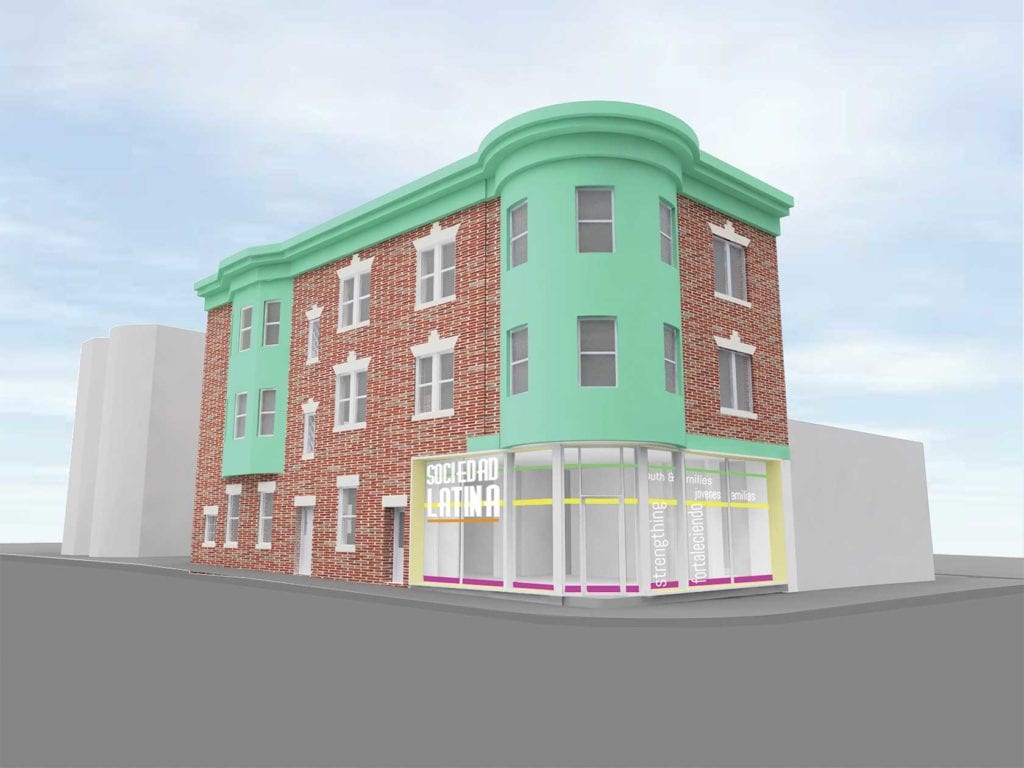
Fifty years ago when Boston’s Puerto Rican community represented less than a percentage point of Boston’s population, Sociedad Latina was the glue that held people together, hosting games of dominos, baseball and dances.
“It started out in South Boston and began as a place of fellowship for people who came here primarily from Puerto Rico,” said Alexandra Oliver-Davila, the organization’s current executive director.
As the city’s racial tensions heated up in the 1970s and the Puerto Rican community shifted into the South End and then Roxbury and Jamaica Plain, Sociedad moved too, in 1983 settling into a three-story brick building at 1530 Tremont Street in Mission Hill, opposite the Basilica of Our Lady of Perpetual Help.
Now with a focus on youth development, Sociedad Latina is one of the city’s largest Latina-led nonprofits. It serves 5,000 teens a year in its Tremont Street office and through its school-based programming, which emphasizes peer-to-peer learning and includes arts, civic engagement, workforce development and college access.
Last year, Sociedad acquired the Mission Hill building where it’s been housed for the past two decades. This year, the organization is celebrating its 50th anniversary with a capital campaign aimed at renovating the building.
“We’re trying to make the space more user-friendly and flexible,” Oliver-Davila said.
The organization has raised $2.5 million of their $10 million goal, which will pay for the renovations and help fund expanded programming and new staff positions including a work readiness coordinator to manage internships and a volunteer recruitment coordinator.
“These are specific positions that will help take us to the next level,” Oliver-Davila said.
Of the remaining $7 million the organization intends to raise through its capital campaign, $5 million will go to building acquisition and renovation and $2 million to operations.
Fifty years after Sociedad Latina’s founding, its mission remains as important to the city’s Latino community as ever. The community has grown to 20 percent of the city’s population, yet Latinos are underrepresented in every sphere of civic life. At the same time, many of the organizations that served the community over the years have folded, including the Hispanic Office of Planning and Evaluation, La Alianza Hispana and the Latino Health Alliance.
“Latinos don’t have the networks more affluent communities have,” Oliver-Davila said.
Part of Sociedad Latina’s mission is to make up for that deficit. For high school students, the organization’s Acceleration Academy provides academic support aimed at opening doors to higher education. For 11th graders, the organization’s Academy for Latinos Achieving Success provides one-on-one coaching, test prep, college visits, application/financial aid support, and post-secondary guidance through a student’s second year in college.
Despite its shift to youth-focused programming, Sociedad Latina still has the soul of a multi-service agency. When Puerto Ricans came to Boston following the devastation of the 2017 Hurricane Maria, the agency deployed its resources to help more than 300 families with resettlement. Boston Public Schools registered students in Sociedad Latina’s building, and state officials used the site to help connect the refugees to health care and other benefits.
“People were literally getting off the plane and coming here,” Oliver-Davila said. “We are nimble. We can meet the community where the needs are.”
That same year, amid increased raids by federal immigration officials, Sociedad convened meetings in Mission Hill with lawyers and Boston Police officials to devise strategies to help families with members detained by Immigration and Customs Enforcement officials.
Sociedad’s programs and initiatives are in line with its historical mission of uplifting the city’s Latino community, according to Oliver-Davila.
“We have remained committed to connecting the Latino community to resources and providing a space for youth to grow and flourish,” she said.








